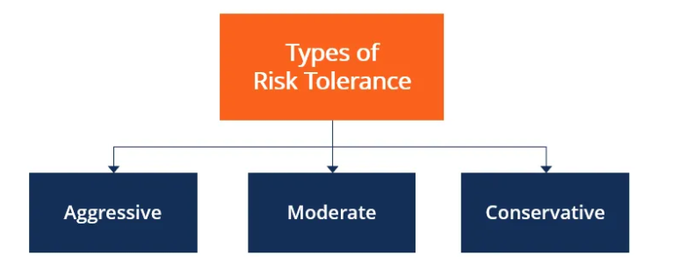I begin with the stock market in a thought that it is an easy and fastest way to make money. Initially, I begin with buy and hold strategy but I felt, that is not what I came for and so I initiated with trading and in few months, (1/n)
As I completed 23 years on this lively planet and 5 years in this stock market, I want to share my 23 mistakes of my Investing journey.
A thread🧵
I begin with the stock market in a thought that it is an easy and fastest way to make money. Initially, I begin with buy and hold strategy but I felt, that is not what I came for and so I initiated with trading and in few months, (1/n)
One quote revamp my mind “Rome was not built in a day and Hiroshima and Nagasaki were destroyed in a day” (2/n)
I lost my faith in 2016 due to such a heavy loss and embark to take tips from TV channels and follow them on daily basis. I don’t know about others but this step failed me miserably. (3/n)
After TV buzz, I start taking tips from my relatives while this idea also failed, because they share their view on personal biases and not based on rationale.
Asking rationale looks like doubting their skills which hurt their ego. (5/n)
If you have a broker as your friend, I advise don’t call him between 9:00 am-3:30 pm, Brokers always seeks thier profit motive. They try to maximize your trades to maximize their brokerage, even though you don’t want to trade or invest. (7/n)
In the initial stage, when I was into trading, I immensely follow the news and radar on the stocks which could be benefitted. I thought, am the smartest guy and stock never move as per expected behaviour as market discounts everything. (8/n)
These 3 words written above are the most dangerous in the stock market. After looking at some successful trade, my confidence was at the peak and thought that I could make it big. (9/n)
After all my hardships in trading, I thought to end up trading and go for investing, begin with penny stocks and thought to make it big like 5x returns in 6 months or so and these penny stocks made my capital penny. (11/n)
I begin to time the market to gain more profits but eventually it all lead to losses. Timing the market is the most dumb thing to do in the stock markets. (13/n)
Selling frequently also leads to higher taxation. At a time, it seems Like from April to December I was earning from myself and from Jan to march only for Government. If you know basic about taxation you will get my point. (14/n)
When I begin with Investing everybody near me earn more than what ROI I could generate. (15/n)
I was afraid to book losses and always biased about my holdings, in hope that it will recover one day and that never happened. In investing, if you know you are wrong, admit it and book your losses. There is no shame in booking losses. (17/n)
Management is the most important point of investing, I failed to check the management quality of Yes bank and you know what happened with the share price. (18/n)
I always had a track of what mutual Fund is buying and selling and without any research. I buy those stocks and these steps also failed me miserably.
(19/n)
I rigorously followed and saw videos what RJ is buying, What RKD is buying and I was buying without my conviction. You get an idea of what would have happened
(21/n)
As a beginner, I Suggest people to empathize more on reading rather than following any media or tips. Reading books helps to build your conviction and try to understand when to buy and when to sell, which is the most important part of the Investing. (22/n)
In my initial trading days when most of my trades were going well, I was biased with control bias and overconfident bias for my trades, I learnt those and hopefully, I am aware of this right now. (23/n)
When my most trades were in my favour I thought it was skill rather than luck but once I came across one the book called fooled by randomness by Taleb and it changed my perception and understood the role of luck in investing. (24/n)
I always had a misconception that money is made in the bull market but this pandemic changed my perception. It’s all about the bear market, bulls just take the credits. If you have bought some stocks in april you know what it means (25/n)
In 2017 after I failed in trading, I was very frightened and whenever my stock moves up, I exit the stock so that I don’t have to face negative return from that stock which led to missed out many multi-bagger stocks. (26/n)
In investing I highly empathized on financials rather than focusing where did these number come up from. I learnt that financials are the small part of investing you have to analyze more than that. (27/n)
In 2017 whenever want to buy some stocks I just go to screener and check is this a good company or not by just checking their financials, many times stock didn’t perform well, after that I understood the core point of investing and now. 28/n
If you are not convicted to buy a stock don’t buy, once upon a time when my broker uses to told me I just buy without any research and never build my conviction. If you cannot build a conviction you are not fit for this game. (29/n)
Be in your COC. Initially,as an investor, I was not knowing my COC and I used to buy some stocks which are in momentum and when you don’t understand the business you don’t know what information can impact the stocks and you end up being in the loss
This is all my mistakes for individuals so that you don’t repeat this mistake and hope you get some learnings from this thread.
Chanakya says “Learn from mistakes of others, you can’t live long enough to make them all yourselves.”
Hope you learn something good today.
https://t.co/ClnlYg5CSN
@Dinesh_Sairam @stockifi_Invest @FinMedium @dmuthuk
More from Trading
Many of you have seen the famous Westrum Organizational Typology model, so prominently featured in State of DevOps Research, Accelerate, DevOps Handbook, etc.
This model was created Dr. Ron Westrum, a widely-cited sociologist who studied the impact of culture on safety
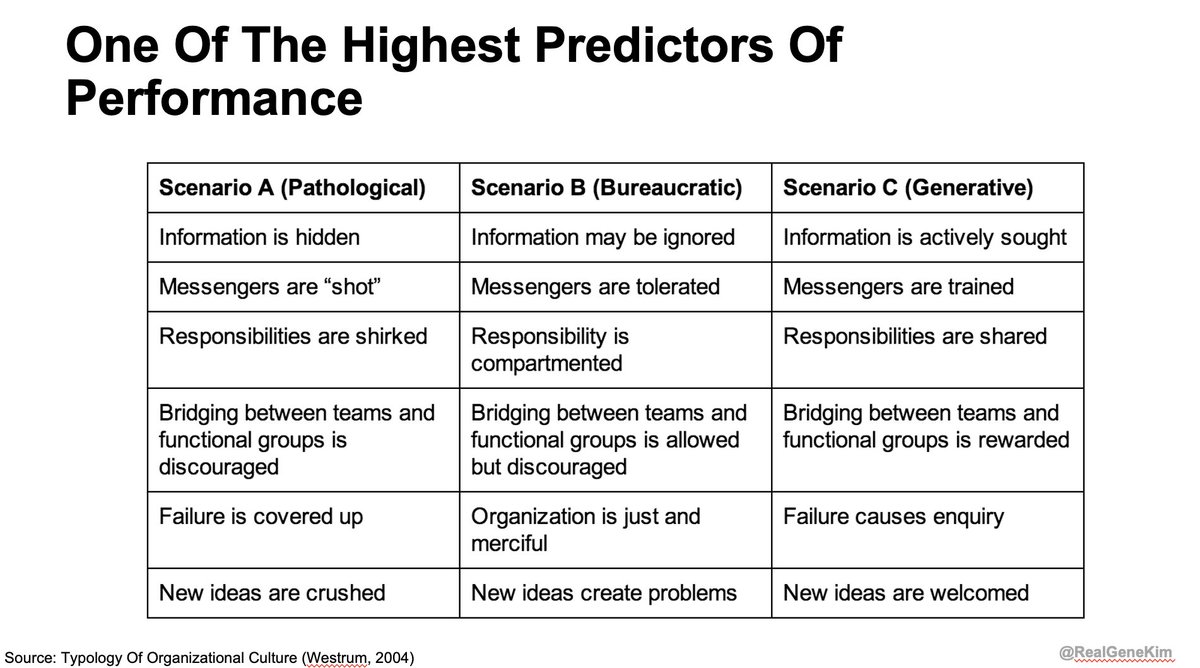
Thanks to Dr. @nicolefv, I was able to interview him for an upcoming episode of the Idealcast! 🤯
It was a very heady experience, and while preparing to interview him, I was startled to discover how much work he's done in healthcare, aviation, spaceflight, but also innovation.
I've read 4+ of his papers, so I thought I was familiar with his work. (Here's one paper: https://t.co/7X00O67VgS)
I was startled to learn he has also studied in depth what enables innovation. He wrote a wonderful book "Sidewinder: Creative Missile Development at China Lake"
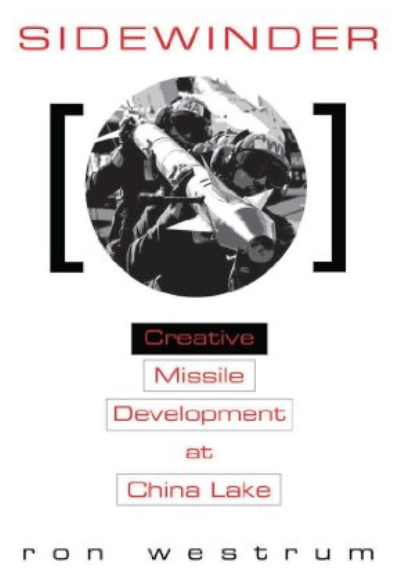
Dr. Westrum writes about China Lake Research Labs: "its design and structure had one purpose: to foster technical creativity. It did; China Lake operated far outside the normal envelope... Sidewinder & others were "impossible" accomplishments,
I love this book because it describes traits of organizations that routinely create and maintain greatness: US space program (Mercury, Gemini, Apollo), US Naval Reactors, Toyota, Team of Teams, Tesla, the tech giants (Amazon, Google, Netflix, Google)
This model was created Dr. Ron Westrum, a widely-cited sociologist who studied the impact of culture on safety

Thanks to Dr. @nicolefv, I was able to interview him for an upcoming episode of the Idealcast! 🤯
It was a very heady experience, and while preparing to interview him, I was startled to discover how much work he's done in healthcare, aviation, spaceflight, but also innovation.
I've read 4+ of his papers, so I thought I was familiar with his work. (Here's one paper: https://t.co/7X00O67VgS)
I was startled to learn he has also studied in depth what enables innovation. He wrote a wonderful book "Sidewinder: Creative Missile Development at China Lake"

Dr. Westrum writes about China Lake Research Labs: "its design and structure had one purpose: to foster technical creativity. It did; China Lake operated far outside the normal envelope... Sidewinder & others were "impossible" accomplishments,
I love this book because it describes traits of organizations that routinely create and maintain greatness: US space program (Mercury, Gemini, Apollo), US Naval Reactors, Toyota, Team of Teams, Tesla, the tech giants (Amazon, Google, Netflix, Google)
You May Also Like
fascinated by this man, mario cortellucci, and his outsized influence on ontario and GTA politics. cortellucci, who lives in vaughan and ran as a far-right candidate for the italian senate back in 2018 - is a major ford donor...
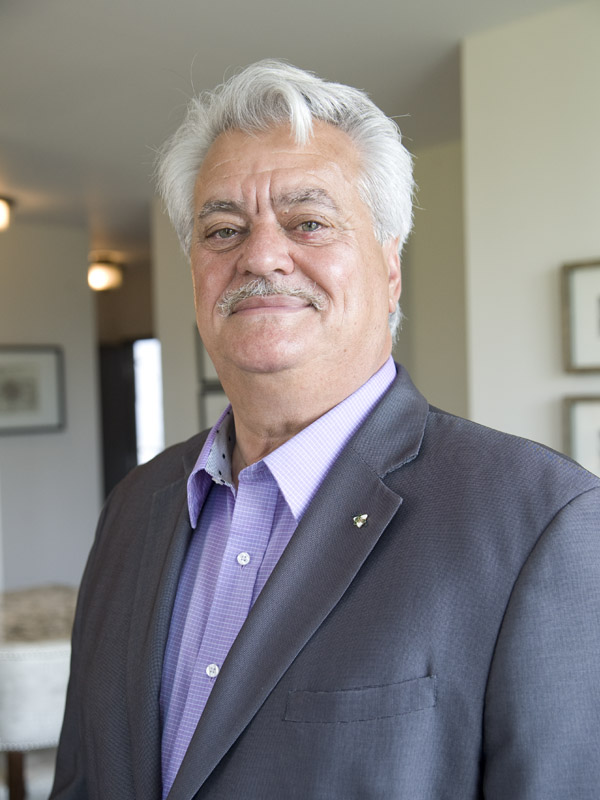
his name might sound familiar because the new cortellucci vaughan hospital at mackenzie health, the one doug ford has been touting lately as a covid-centric facility, is named after him and his family
but his name also pops up in a LOT of other ford projects. for instance - he controls the long term lease on big parts of toronto's portlands... where doug ford once proposed building an nfl stadium and monorail... https://t.co/weOMJ51bVF
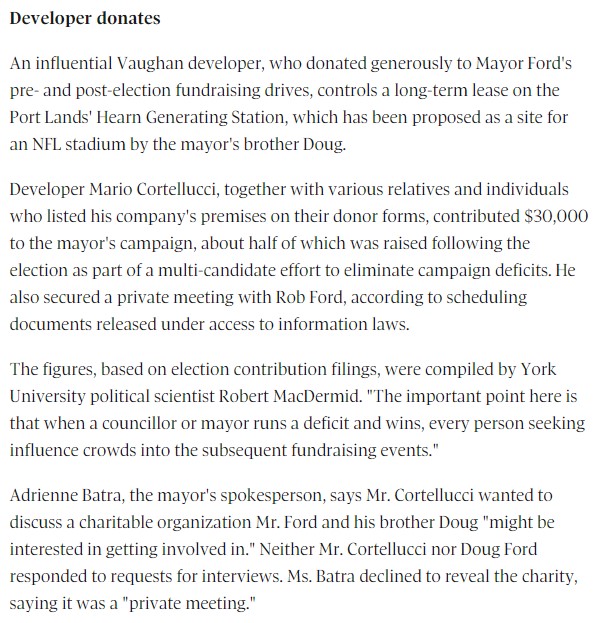
cortellucci, who is a developer, also owns a large chunk of the greenbelt. doug ford's desire to develop the greenbelt has been
and late last year he rolled back the mandate of conservation authorities there, prompting the resignations of several members of the greenbelt advisory

his name might sound familiar because the new cortellucci vaughan hospital at mackenzie health, the one doug ford has been touting lately as a covid-centric facility, is named after him and his family
but his name also pops up in a LOT of other ford projects. for instance - he controls the long term lease on big parts of toronto's portlands... where doug ford once proposed building an nfl stadium and monorail... https://t.co/weOMJ51bVF

cortellucci, who is a developer, also owns a large chunk of the greenbelt. doug ford's desire to develop the greenbelt has been
and late last year he rolled back the mandate of conservation authorities there, prompting the resignations of several members of the greenbelt advisory
1/“What would need to be true for you to….X”
Why is this the most powerful question you can ask when attempting to reach an agreement with another human being or organization?
A thread, co-written by @deanmbrody:
2/ First, “X” could be lots of things. Examples: What would need to be true for you to
- “Feel it's in our best interest for me to be CMO"
- “Feel that we’re in a good place as a company”
- “Feel that we’re on the same page”
- “Feel that we both got what we wanted from this deal
3/ Normally, we aren’t that direct. Example from startup/VC land:
Founders leave VC meetings thinking that every VC will invest, but they rarely do.
Worse over, the founders don’t know what they need to do in order to be fundable.
4/ So why should you ask the magic Q?
To get clarity.
You want to know where you stand, and what it takes to get what you want in a way that also gets them what they want.
It also holds them (mentally) accountable once the thing they need becomes true.
5/ Staying in the context of soliciting investors, the question is “what would need to be true for you to want to invest (or partner with us on this journey, etc)?”
Multiple responses to this question are likely to deliver a positive result.
Why is this the most powerful question you can ask when attempting to reach an agreement with another human being or organization?
A thread, co-written by @deanmbrody:
Next level tactic when closing a sale, candidate, or investment:
— Erik Torenberg (@eriktorenberg) February 27, 2018
Ask: \u201cWhat needs to be true for you to be all in?\u201d
You'll usually get an explicit answer that you might not get otherwise. It also holds them accountable once the thing they need becomes true.
2/ First, “X” could be lots of things. Examples: What would need to be true for you to
- “Feel it's in our best interest for me to be CMO"
- “Feel that we’re in a good place as a company”
- “Feel that we’re on the same page”
- “Feel that we both got what we wanted from this deal
3/ Normally, we aren’t that direct. Example from startup/VC land:
Founders leave VC meetings thinking that every VC will invest, but they rarely do.
Worse over, the founders don’t know what they need to do in order to be fundable.
4/ So why should you ask the magic Q?
To get clarity.
You want to know where you stand, and what it takes to get what you want in a way that also gets them what they want.
It also holds them (mentally) accountable once the thing they need becomes true.
5/ Staying in the context of soliciting investors, the question is “what would need to be true for you to want to invest (or partner with us on this journey, etc)?”
Multiple responses to this question are likely to deliver a positive result.






